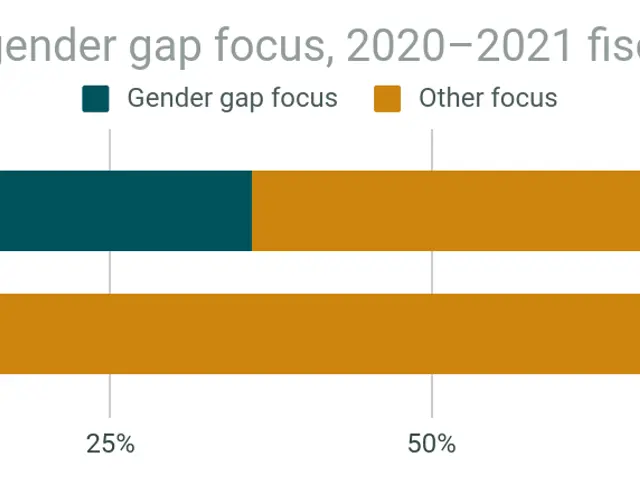China confirms retaliation promise following American warning of 50% customs duty hike escalation
In response to US President Donald Trump's recent claims of escalating tariffs unless China withdrew its retaliatory tariffs against the US by April 8, the Chinese Foreign Ministry and Commerce Ministry have vowed to take countermeasures to protect their rights and interests.
On Tuesday, Foreign Ministry spokesperson Lin Jian said at the regular Foreign Ministry press conference that China will not tolerate any attempt to harm its sovereignty, security, and development interests. Lin also noted that the US doesn't seem serious about negotiating at the moment.
In a post on Truth Social on Monday, the US president threatened China with an extra 50 percent tariff on goods imported into the US if China did not withdraw its 34 percent counter-tariff on US products. In response to this, China will take resolute and strong measures to safeguard its legitimate rights and interests, according to a statement published on the Commerce Ministry's website.
Experts suggest that China is prepared to employ a comprehensive range of countermeasures in response to US actions, including:
Implemented Countermeasures:
- Tariff Increases: China has raised retaliatory tariffs on US-origin goods, initially increasing them from 34% to 84% and later raising them further to 125% in response to US tariffs[1][2].
- Non-Tariff Measures: These include export restrictions on rare earth materials, adding US defense and tech firms to the Export Control List and Unreliable Entity List, initiating antidumping investigations, and suspending imports of certain US agricultural products[2].
- WTO Complaints: China has filed formal complaints with the World Trade Organization challenging the legality of US tariff measures[2].
Potential Future Countermeasures:
- Expanded Export Restrictions: Further restrictions on key materials or technologies could be imposed to pressure the US by disrupting supply chains.
- Enhanced Diplomatic Efforts: China could intensify diplomatic pressure against countries that align with US interests in the trade war, as seen in its warning against countries making trade deals at China's expense[3].
- Targeted Economic Actions: Specific economic actions, such as targeted boycotts of US products or investments in sectors critical to the US, could be employed.
- Strategic Diversification: China might accelerate efforts to reduce reliance on US goods and services by diversifying trade partnerships and investments.
These measures aim to safeguard China's economic interests and confront the US tariffs head-on. Regardless of global uncertainties, China remains resolute in its path toward reform and opening-up and is committed to promoting bilateral and multilateral cooperation.
- The ongoing economic trade war between the US and China has led to a potential recession, causing concerns about global economic growth.
- Imports of US goods have significantly decreased due to China's retaliatory tariffs, impacting many sectors and businesses in the United States.
- A higher inflation rate in the US could be a consequence of the escalating tariffs, as it increases the cost of imports.
- The Chinese economy, on the other hand, has shown resilience amidst these trade conflicts, with exports continuing to rise despite US tariffs.
- The Foreign Ministry of China, led by spokesperson Lin Jian, has been vocal about the country's stance on the trade war.
- The US president's threats of additional tariffs have prompted the VCG (Voice of China) to intensify its coverage of the trade disputes, providing updates and analysis to the Chinese public.
- Migration patterns within China might be affected, as the economy braces itself for potential economic downturns.
- Education and self-development, along with personal growth, are crucial for individuals seeking to adapt to the changing economic landscape.
- Mindfulness and stress management techniques could become increasingly important as people grapple with the uncertainties caused by war and conflicts, including the trade war between the US and China.
- Productivity levels at workplaces may be impacted, as companies navigate through the complexities of policy changes and legislations related to the tariffs.
- Career development and skills training have become more important, as employees prepare for potential job losses or shifts in their industries.
- In the midst of this economic turmoil, the US-China policy and legislation over trade tariffs will be closely watched by political analysts worldwide.
- The tariffs could result in an increase in car accidents due to higher prices of imported auto parts, affecting safety standards and costs for consumers and manufacturers.
- The global political landscape has been shaken, as countries try to understand and respond to the US-China trade war.
- Online education platforms have seen a surge in demand, as students seek to further their knowledge in response to these economic developments.
- Job-search platforms are experiencing an influx of job seekers, reflecting the uncertainty surrounding employment opportunities.
- General news outlets are publishing numerous articles on the trade war, providing updates on the ongoing negotiations and countermeasures.
- Crime and justice in both countries might be affected, as the increased economic strain pushes some individuals to commit illegal activities out of desperation.
- Accidents due to reckless driving or negligence could rise, as road safety may take a back seat during these challenging times.
- Fires and other accidents could increase in number, as budget constraints lead to inadequate firefighting equipment and resources.
- The need for lifelong learning and continuous skill development has become more pressing, as people prepare for the evolving job market.
- Goal-setting is crucial in these challenging times, as individuals and organizations look to find stability amidst the uncertainties.
- Lifelong learning and skills training are essential for proactive adaptation to the changes in the job market, maintaining a competitive edge in one's chosen career.
- The suspension of imports from the US has impacted various sectors, leading to a shortage of certain goods and raw materials in China.
- Mixed-martial arts (MMA) tournaments may see a decline in international participation, as athletes face challenges with travel restrictions and visa issues.
- The Champions League football tournament could see shifts in strategy as teams grapple with the implications of the US-China trade war on their sponsorship deals.
- The NFL (National Football League) could experience financial and logistical challenges due to potential disruptions in its supply chain, impacting team operations and fan experiences.
- WNBA (Women's National Basketball Association) players and teams might face sponsorship and funding challenges, as advertising partners might reconsider their investments in light of the trade tensions.
- MLB (Major League Baseball) teams, deeply interconnected with their international peers, might face costs increases and decreased profits due to the tariffs.
- The escalation of tariffs could further strain relations between the US and China, affecting sports events, partnerships, and investment opportunities in sports betting, hockey, golf, tennis, and racing, including European leagues, NBA, Premier League, and the Masters tournament.








